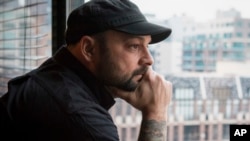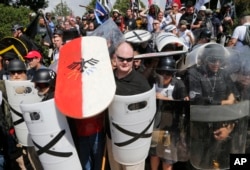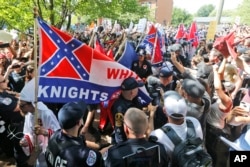Christian Picciolini has long been sounding the alarm about the threat posed by America's white violent extremists. He knows what he's talking about — he used to be one of them.
The son of Italian immigrants, Picciolini was recruited into the Chicago Area Skinheads, America's first neo-Nazi skinhead gang, in 1987. He was 14 years old.
By 16, Picciolini was thrust into the helm of the young organization after its leader was imprisoned for brutally pistol-whipping a female member who had been seen with a black man.
He led the organization for the next six years and later merged it with the Hammerskin Nation, which remains active today and which the Southern Poverty Law Center calls "the best organized, most widely dispersed and most dangerous Skinhead group known."
But by 1995, Picciolini was a married father of two children who didn't want them to be a part of his ideology. Increasingly disillusioned, he left the group and went on to co-found Life After Hate, a Chicago-based nonprofit that works to deradicalize former neo-Nazis.
In the aftermath of the violent protests in Charlottesville, Virginia, Picciolini has been speaking out against white supremacy. He says the racist speech of today's white nationalists is the same message he and his cohorts spouted 30 years ago.
In an interview with VOA, Picciolini discusses the neo-Nazi organization, the Charlottesville unrest and the outlook for white nationalism in America. The interview has been edited for clarity and length.
Q: In a recent interview, you said that what you saw in Charlottesville was the same as what you were a part of 30 years ago. Tell us about the similarities.
A: Thirty years ago, in 1987 when I was 14 years old, I was recruited into America's first neo-Nazi skinhead group. I spent eight years as a part of that. And what I saw during those eight years was what I saw happen in Charlottesville. There were rallies with large numbers of protesters. We need to understand this is something that has been happening for a long time and we've been sweeping it under the rug. I'm glad we're focusing on it now. I also want to make sure this isn't something that we lose sight of again and end up revisiting in several years.
Q: What draws people to these groups today? Is it their ideology?
A: I don't believe ideology is a driver to radicalization. I think it's just a vehicle to be violent. I think what ultimately leads people to these extremist groups is something we all search for: We're all looking for an identity, community and a sense of purpose.
If that search is a broken one, if there is some underlying trauma or brokenness or abuse or mental illness or even feelings of abandonment and shame and people are marginalized, they tend to look for acceptance in negative pathways.
And the recruiters for these groups, whether we're talking about the far right or even ISIS [Islamic State] or even street gangs in the inner cities of America, the whole idea of recruitment is to offer comfort to people who are the most marginalized, promise them paradise, and win their hearts and minds once they've delivered a bit of that.
The movement, especially the far-right movement, is very good at promising that identity to the most marginalized people, giving them a sense of community and redirecting somebody's sense of purpose.
Q: Members of the so-called alt-right say they're often misrepresented by the media and that they have legitimate concerns. What are their concerns?
A: The marketing face of this movement has always been such that it's been much more toned down and then, behind closed doors, the mission is the same and that is, essentially, to create a white homeland at the expense of anybody else.
I can tell you from experience, from having done this and taught this tactic: When speaking to the media and having outward-facing dialogue, the rhetoric is much more subtle.
We hear things like dog whistles or the idea that they're spinning it to be a movement of love, so what they'll tell the public and when in front of cameras [is] that they don't hate anybody, that this is something they're just doing because they're protecting something that they love, which is white identity, that there is nothing wrong with being proud of being white, which of course is true. There is nothing wrong with being proud of who you are.
However, when that marginalizes other people, when that begins to threaten the safety, independence and freedoms of other people ... then that becomes a movement of marginalization and hate.
Behind closed doors, the language is quite different. Behind closed doors, that pro-white talk turns into anti-everybody else, even so far as talk of eliminating people based on their skin color or their religion and talk of claiming the United States as a white homeland even through violent means.
Q: You've said that nine times out of 10, the white supremacists haven't had a meaningful interaction with people they hate.
A: That's true. Through the people that I work with, what I try to do is not argue ideologically with them. I don't try to debate with them or tell them they're wrong, even though I believe that they are. Instead, I try to listen. I listen for what I call potholes, and it could be things that deviated their path from their original path. Things like trauma or abuse or addiction or mental illness or joblessness or, sometimes, extreme privilege and isolation could be key.
And when I listen for the potholes, I try to fill them in and make the person more resilient but, as part of that, how I challenge the ideology is that I will introduce them to the people that they think they hate. Like you said, nine times out of 10, and I'd say nine and half times out of 10, the folks that are involved in these hate groups, never in their lives had a meaningful interaction or dialogue with people that they claim to hate. Yet they hate them and blame the world's problems, their own problems, on these people whom they've demonized.
As part of my process of humanization, I bring people together, so that the hater can dispel the myth that's in their head about who they think this person is. It could be a Holocaust denier with a Holocaust survivor. It could be an Islamophobe that I'll introduce to an imam and maybe we have dinner with a Muslim family. Or it could be going to an LGBTQ community center with somebody who has homophobic tendencies to basically build a bridge that they can realize and humanize the people that they think they hate and suddenly realize that we have more similarities than differences.
Q: What did Charlottesville signify for the white nationalist movement in this country?
A: Charlottesville was a bit of a launching pad of momentum for the white nationalist movement. Let's be clear here: When we say alt-right, when we say white nationalist or neo-Nazi or KKK, what we're talking about is a general white supremacist movement. And there really is no difference between those groups other than nuanced cultural differences of what exactly they believe but, ultimately, they all believe in the mantra that they must further the white race and protect it by eliminating everybody else.
If we're talking about these groups, and Charlottesville, what it did was give them legitimacy that they're bigger than they are. Now that's not to say that they're still not dangerous because we know small groups of people can be dangerous, but I do believe this represents a small minority of the people in our country who are actively part of this movement.
But with all the coverage, with all the talk, it certainly brought them some momentum and a legitimacy that maybe they didn't enjoy before. I also think it was a really pivotal moment for America. What we started to collectively agree was happening [was that] this existed, that this is a problem that we face in our country that we can no longer sweep under the rug or ignore, that this is something that is very deeply seated in our fabric and is something that we need to tackle head on.
Q: Are we going to see more Charlottesvilles? Is the situation going to get worse before it gets better?
A: I think it may get a little worse before it gets better. I think that's partly due to the fact that as an American society, we really are not focused on the right way to counter it. We've seen demonstrations and I support them. We've seen violence and I don't support that. We've seen government tactics that resemble a little more intelligence gathering and law enforcement as opposed to community policing or trying to counter violent extremism through grass-roots approaches in the community.
There hasn't been a focus on the far right in our country, as far as extremism goes. And I think until we apply the right resources to it, or call it what it is when there is a violent act — that it is an act of terrorism based on an ideological premise.
Unfortunately, this is nothing new. Charlottesville is a rally that had an unfortunate tragic consequence, but those rallies have been happening for years, so I suspect they'll continue to happen, though they may metastasize into something different as the pressure is being put on them.







